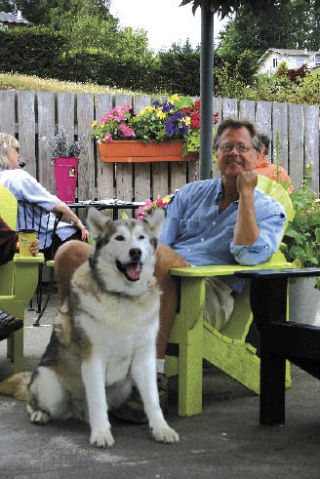For some months now, I have lived happily in what turns out to be a state of delusion.
Then, at a lawn party during Strawberry Festival, someone asked me how I came to be living on this fair and funky isle, and I answered, with the air of someone certain his answer would leave his audience stupefied with amazement, “I came to visit for a couple of days and just never left!”
Almost immediately, from the people within earshot, came a chorus of “Me too!” and “So did we!”
Thus is our belief in our uniqueness humbled.
But it’s true. I came to stay for a few days with a dear friend who was renting a house in Burton, was captivated, found a house of my own to rent a week later, and that was that.
Acting on impulse is not normal for me, but Vashon is not normal. Vashon, I realized almost the moment I arrived, was home. In sensing that and yielding to it, I now know, I am not alone. But it was a first for me. I have been searching for home for most of my life.
The word “home” is one of the most frequently used words in every language known to man. Yet defining it is a bit like trying to grasp a greased pig; it’s remarkably slippery. Among other things, the word — in English at least — manages to suggest both a physical place and a condition of being. Is home where you live or where you came from? Is it the place that houses your belongings, or is it the place where you belong? Is it a place at all, or is it a state of mind?
The Oxford English Dictionary devotes more than four large, three-column pages of tiny print to definitions of the word home, and that’s just for the noun form of the word. The primary definition says home is, “a village or town, a collection of dwellings; a village with its cottages.” OK, so clearly then, home is not simply a shelter or dwelling. It has more to do with what we might today call a sense of “community.”
But it’s the fifth entry in the OED that gets to the very heart—literally, to the emotional core—of what I think we mean by home: “A place, region, or state to which one properly belongs, in which one’s affections centre, or where one finds refuge, rest, or satisfaction.”
The kicker here, I think, is that phrase, “to which one properly belongs.” How do we know where that is? In his poem “The Death of the Hired Man,” the flinty bard of New England, Robert Frost, has a farmer say to his wife, “Home is the place where, if you have to go there, they have to take you in”—a sentiment about as chilly as a New Hampshire winter. The wife replies, in quiet rebuke, “I should have called it something you somehow haven’t to deserve.” It is a wonderfully prickly exchange: the first grudging, the second generous. But how does anyone know where they “properly belong?” Put differently, how would we know the place where we properly belonged if we stumbled upon it? What would it look like?
I can answer that question now. It looks like a place where there is a flower stand that operates on the honor system: you leave money in a box. It’s a place where the tough-talking, soft-hearted owner of the neighborhood general store will jot down what you owe her in a little notebook if you’re short of cash. It’s a place where you stop in at the espresso stand to grab a coffee but the company’s so good and the conversation so lively you stay for an hour. It’s a place where, if you’re out walking the dog and someone drives up who knows you, they stop and chat…and the car behind them doesn’t honk. It’s a place where your kids can ride a bike on the “highway” and you know they’ll still be safe. It’s a place where the best bread is baked by an employee of the grocery store…and the grocery store actually carries it. It’s a place where the hardware store has everything you need and if it doesn’t you probably didn’t need it, and even if you did someone will show you how to solve the problem some other way.
It looks, in short, like Vashon. My home.


